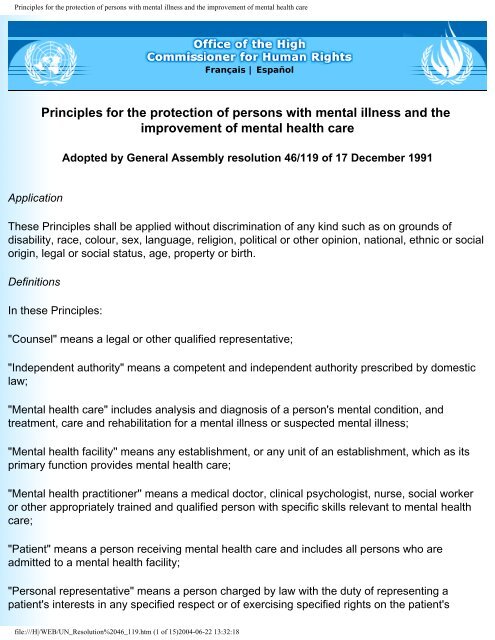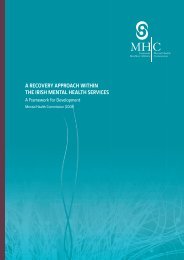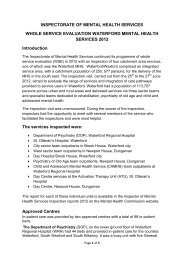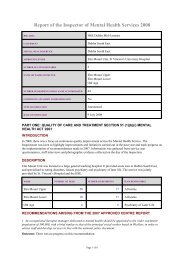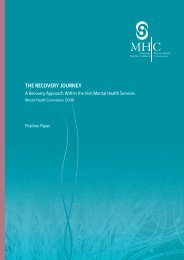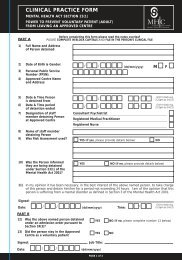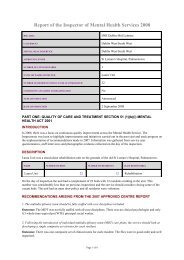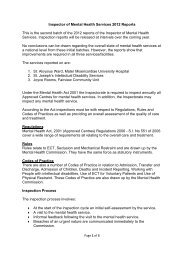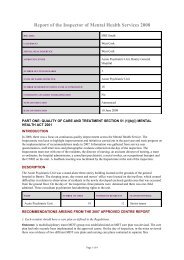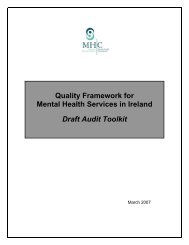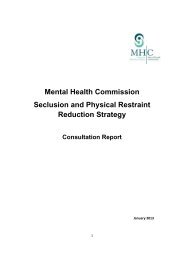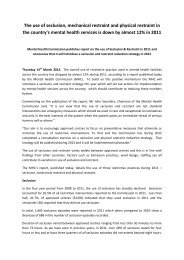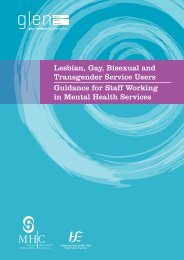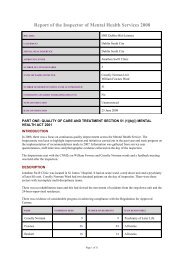Principles for the protection of persons with mental illness and the ...
Principles for the protection of persons with mental illness and the ...
Principles for the protection of persons with mental illness and the ...
You also want an ePaper? Increase the reach of your titles
YUMPU automatically turns print PDFs into web optimized ePapers that Google loves.
<strong>Principles</strong> <strong>for</strong> <strong>the</strong> <strong>protection</strong> <strong>of</strong> <strong>persons</strong> <strong>with</strong> <strong>mental</strong> <strong>illness</strong> <strong>and</strong> <strong>the</strong> improvement <strong>of</strong> <strong>mental</strong> health carebehalf, <strong>and</strong> includes <strong>the</strong> parent or legal guardian <strong>of</strong> a minor unless o<strong>the</strong>rwise provided bydomestic law;"The review body" means <strong>the</strong> body established in accordance <strong>with</strong> Principle 17 to review <strong>the</strong>involuntary admission or retention <strong>of</strong> a patient in a <strong>mental</strong> health facility.General limitation clauseThe exercise <strong>of</strong> <strong>the</strong> rights set <strong>for</strong>th in <strong>the</strong>se <strong>Principles</strong> may be subject only to such limitations asare prescribed by law <strong>and</strong> are necessary to protect <strong>the</strong> health or safety <strong>of</strong> <strong>the</strong> person concernedor <strong>of</strong> o<strong>the</strong>rs, or o<strong>the</strong>rwise to protect public safety, order, health or morals or <strong>the</strong> funda<strong>mental</strong>rights <strong>and</strong> freedoms <strong>of</strong> o<strong>the</strong>rs.Principle 1Funda<strong>mental</strong> freedoms <strong>and</strong> basic rights1. All <strong>persons</strong> have <strong>the</strong> right to <strong>the</strong> best available <strong>mental</strong> health care, which shall be part <strong>of</strong> <strong>the</strong>health <strong>and</strong> social care system.2. All <strong>persons</strong> <strong>with</strong> a <strong>mental</strong> <strong>illness</strong>, or who are being treated as such <strong>persons</strong>, shall be treated<strong>with</strong> humanity <strong>and</strong> respect <strong>for</strong> <strong>the</strong> inherent dignity <strong>of</strong> <strong>the</strong> human person.3. All <strong>persons</strong> <strong>with</strong> a <strong>mental</strong> <strong>illness</strong>, or who are being treated as such <strong>persons</strong>, have <strong>the</strong> right to<strong>protection</strong> from economic, sexual <strong>and</strong> o<strong>the</strong>r <strong>for</strong>ms <strong>of</strong> exploitation, physical or o<strong>the</strong>r abuse <strong>and</strong>degrading treatment.4. There shall be no discrimination on <strong>the</strong> grounds <strong>of</strong> <strong>mental</strong> <strong>illness</strong>. "Discrimination" means anydistinction, exclusion or preference that has <strong>the</strong> effect <strong>of</strong> nullifying or impairing equal enjoyment<strong>of</strong> rights. Special measures solely to protect <strong>the</strong> rights, or secure <strong>the</strong> advancement, <strong>of</strong> <strong>persons</strong><strong>with</strong> <strong>mental</strong> <strong>illness</strong> shall not be deemed to be discriminatory. Discrimination does not includeany distinction, exclusion or preference undertaken in accordance <strong>with</strong> <strong>the</strong> provisions <strong>of</strong> <strong>the</strong>se<strong>Principles</strong> <strong>and</strong> necessary to protect <strong>the</strong> human rights <strong>of</strong> a person <strong>with</strong> a <strong>mental</strong> <strong>illness</strong> or <strong>of</strong>o<strong>the</strong>r individuals.5. Every person <strong>with</strong> a <strong>mental</strong> <strong>illness</strong> shall have <strong>the</strong> right to exercise all civil, political, economic,social <strong>and</strong> cultural rights as recognized in <strong>the</strong> Universal Declaration <strong>of</strong> Human Rights, <strong>the</strong>International Covenant on Economic, Social <strong>and</strong> Cultural Rights, <strong>the</strong> International Covenant onCivil <strong>and</strong> Political Rights, <strong>and</strong> in o<strong>the</strong>r relevant instruments, such as <strong>the</strong> Declaration on <strong>the</strong>Rights <strong>of</strong> Disabled Persons <strong>and</strong> <strong>the</strong> Body <strong>of</strong> <strong>Principles</strong> <strong>for</strong> <strong>the</strong> Protection <strong>of</strong> All Persons underAny Form <strong>of</strong> Detention or Imprisonment.file:///H|/WEB/UN_Resolution%2046_119.htm (2 <strong>of</strong> 15)2004-06-22 13:32:18
<strong>Principles</strong> <strong>for</strong> <strong>the</strong> <strong>protection</strong> <strong>of</strong> <strong>persons</strong> <strong>with</strong> <strong>mental</strong> <strong>illness</strong> <strong>and</strong> <strong>the</strong> improvement <strong>of</strong> <strong>mental</strong> health care6. Any decision that, by reason <strong>of</strong> his or her <strong>mental</strong> <strong>illness</strong>, a person lacks legal capacity, <strong>and</strong>any decision that, in consequence <strong>of</strong> such incapacity, a personal representative shall beappointed, shall be made only after a fair hearing by an independent <strong>and</strong> impartial tribunalestablished by domestic law. The person whose capacity is at issue shall be entitled to berepresented by a counsel. If <strong>the</strong> person whose capacity is at issue does not himself or herselfsecure such representation, it shall be made available <strong>with</strong>out payment by that person to <strong>the</strong>extent that he or she does not have sufficient means to pay <strong>for</strong> it. The counsel shall not in <strong>the</strong>same proceedings represent a <strong>mental</strong> health facility or its personnel <strong>and</strong> shall not also representa member <strong>of</strong> <strong>the</strong> family <strong>of</strong> <strong>the</strong> person whose capacity is at issue unless <strong>the</strong> tribunal is satisfiedthat <strong>the</strong>re is no conflict <strong>of</strong> interest. Decisions regarding capacity <strong>and</strong> <strong>the</strong> need <strong>for</strong> a personalrepresentative shall be reviewed at reasonable intervals prescribed by domestic law. Theperson whose capacity is at issue, his or her personal representative, if any, <strong>and</strong> any o<strong>the</strong>rinterested person shall have <strong>the</strong> right to appeal to a higher court against any such decision.7. Where a court or o<strong>the</strong>r competent tribunal finds that a person <strong>with</strong> <strong>mental</strong> <strong>illness</strong> is unable tomanage his or her own affairs, measures shall be taken, so far as is necessary <strong>and</strong> appropriateto that person's condition, to ensure <strong>the</strong> <strong>protection</strong> <strong>of</strong> his or her interest.Principle 2Protection <strong>of</strong> minorsSpecial care should be given <strong>with</strong>in <strong>the</strong> purposes <strong>of</strong> <strong>the</strong>se <strong>Principles</strong> <strong>and</strong> <strong>with</strong>in <strong>the</strong> context <strong>of</strong>domestic law relating to <strong>the</strong> <strong>protection</strong> <strong>of</strong> minors to protect <strong>the</strong> rights <strong>of</strong> minors, including, ifnecessary, <strong>the</strong> appointment <strong>of</strong> a personal representative o<strong>the</strong>r than a family member.Principle 3Life in <strong>the</strong> communityEvery person <strong>with</strong> a <strong>mental</strong> <strong>illness</strong> shall have <strong>the</strong> right to live <strong>and</strong> work, as far as possible, in <strong>the</strong>community.Principle 4Determination <strong>of</strong> <strong>mental</strong> <strong>illness</strong>1. A determination that a person has a <strong>mental</strong> <strong>illness</strong> shall be made in accordance <strong>with</strong>internationally accepted medical st<strong>and</strong>ards.2. A determination <strong>of</strong> <strong>mental</strong> <strong>illness</strong> shall never be made on <strong>the</strong> basis <strong>of</strong> political, economic orsocial status, or membership <strong>of</strong> a cultural, racial or religious group, or any o<strong>the</strong>r reason notfile:///H|/WEB/UN_Resolution%2046_119.htm (3 <strong>of</strong> 15)2004-06-22 13:32:18
<strong>Principles</strong> <strong>for</strong> <strong>the</strong> <strong>protection</strong> <strong>of</strong> <strong>persons</strong> <strong>with</strong> <strong>mental</strong> <strong>illness</strong> <strong>and</strong> <strong>the</strong> improvement <strong>of</strong> <strong>mental</strong> health caredirectly relevant to <strong>mental</strong> health status.3. Family or pr<strong>of</strong>essional conflict, or non-con<strong>for</strong>mity <strong>with</strong> moral, social, cultural or political valuesor religious beliefs prevailing in a person's community, shall never be a determining factor indiagnosing <strong>mental</strong> <strong>illness</strong>.4. A background <strong>of</strong> past treatment or hospitalization as a patient shall not <strong>of</strong> itself justify anypresent or future determination <strong>of</strong> <strong>mental</strong> <strong>illness</strong>.5. No person or authority shall classify a person as having, or o<strong>the</strong>rwise indicate that a personhas, a <strong>mental</strong> <strong>illness</strong> except <strong>for</strong> purposes directly relating to <strong>mental</strong> <strong>illness</strong> or <strong>the</strong> consequences<strong>of</strong> <strong>mental</strong> <strong>illness</strong>.Principle 5Medical examinationNo person shall be compelled to undergo medical examination <strong>with</strong> a view to determiningwhe<strong>the</strong>r or not he or she has a <strong>mental</strong> <strong>illness</strong> except in accordance <strong>with</strong> a procedure authorizedby domestic law.Principle 6ConfidentialityThe right <strong>of</strong> confidentiality <strong>of</strong> in<strong>for</strong>mation concerning all <strong>persons</strong> to whom <strong>the</strong>se <strong>Principles</strong> applyshall be respected.Principle 7Role <strong>of</strong> community <strong>and</strong> culture1. Every patient shall have <strong>the</strong> right to be treated <strong>and</strong> cared <strong>for</strong>, as far as possible, in <strong>the</strong>community in which he or she lives.2. Where treatment takes place in a <strong>mental</strong> health facility, a patient shall have <strong>the</strong> right,whenever possible, to be treated near his or her home or <strong>the</strong> home <strong>of</strong> his or her relatives orfriends <strong>and</strong> shall have <strong>the</strong> right to return to <strong>the</strong> community as soon as possible.3. Every patient shall have <strong>the</strong> right to treatment suited to his or her cultural background.Principle 8file:///H|/WEB/UN_Resolution%2046_119.htm (4 <strong>of</strong> 15)2004-06-22 13:32:18
<strong>Principles</strong> <strong>for</strong> <strong>the</strong> <strong>protection</strong> <strong>of</strong> <strong>persons</strong> <strong>with</strong> <strong>mental</strong> <strong>illness</strong> <strong>and</strong> <strong>the</strong> improvement <strong>of</strong> <strong>mental</strong> health careSt<strong>and</strong>ards <strong>of</strong> care1. Every patient shall have <strong>the</strong> right to receive such health <strong>and</strong> social care as is appropriate tohis or her health needs, <strong>and</strong> is entitled to care <strong>and</strong> treatment in accordance <strong>with</strong> <strong>the</strong> samest<strong>and</strong>ards as o<strong>the</strong>r ill <strong>persons</strong>.2. Every patient shall be protected from harm, including unjustified medication, abuse by o<strong>the</strong>rpatients, staff or o<strong>the</strong>rs or o<strong>the</strong>r acts causing <strong>mental</strong> distress or physical discom<strong>for</strong>t.Principle 9Treatment1. Every patient shall have <strong>the</strong> right to be treated in <strong>the</strong> least restrictive environment <strong>and</strong> <strong>with</strong><strong>the</strong> least restrictive or intrusive treatment appropriate to <strong>the</strong> patient's health needs <strong>and</strong> <strong>the</strong> needto protect <strong>the</strong> physical safety <strong>of</strong> o<strong>the</strong>rs.2. The treatment <strong>and</strong> care <strong>of</strong> every patient shall be based on an individually prescribed plan,discussed <strong>with</strong> <strong>the</strong> patient, reviewed regularly, revised as necessary <strong>and</strong> provided by qualifiedpr<strong>of</strong>essional staff.3. Mental health care shall always be provided in accordance <strong>with</strong> applicable st<strong>and</strong>ards <strong>of</strong> ethics<strong>for</strong> <strong>mental</strong> health practitioners, including internationally accepted st<strong>and</strong>ards such as <strong>the</strong><strong>Principles</strong> <strong>of</strong> Medical Ethics adopted by <strong>the</strong> United Nations General Assembly. Mental healthknowledge <strong>and</strong> skills shall never be abused.4. The treatment <strong>of</strong> every patient shall be directed towards preserving <strong>and</strong> enhancing personalautonomy.Principle 10Medication1. Medication shall meet <strong>the</strong> best health needs <strong>of</strong> <strong>the</strong> patient, shall be given to a patient only <strong>for</strong><strong>the</strong>rapeutic or diagnostic purposes <strong>and</strong> shall never be administered as a punishment or <strong>for</strong> <strong>the</strong>convenience <strong>of</strong> o<strong>the</strong>rs. Subject to <strong>the</strong> provisions <strong>of</strong> paragraph 15 <strong>of</strong> Principle 11, <strong>mental</strong> healthpractitioners shall only administer medication <strong>of</strong> known or demonstrated efficacy.2. All medication shall be prescribed by a <strong>mental</strong> health practitioner authorized by law <strong>and</strong> shallbe recorded in <strong>the</strong> patient's records.file:///H|/WEB/UN_Resolution%2046_119.htm (5 <strong>of</strong> 15)2004-06-22 13:32:18
<strong>Principles</strong> <strong>for</strong> <strong>the</strong> <strong>protection</strong> <strong>of</strong> <strong>persons</strong> <strong>with</strong> <strong>mental</strong> <strong>illness</strong> <strong>and</strong> <strong>the</strong> improvement <strong>of</strong> <strong>mental</strong> health carePrinciple 11Consent to treatment1. No treatment shall be given to a patient <strong>with</strong>out his or her in<strong>for</strong>med consent, except asprovided <strong>for</strong> in paragraphs 6, 7, 8, 13 <strong>and</strong> 15 below.2. In<strong>for</strong>med consent is consent obtained freely, <strong>with</strong>out threats or improper inducements, afterappropriate disclosure to <strong>the</strong> patient <strong>of</strong> adequate <strong>and</strong> underst<strong>and</strong>able in<strong>for</strong>mation in a <strong>for</strong>m <strong>and</strong>language understood by <strong>the</strong> patient on:(a) The diagnostic assessment;(b) The purpose, method, Likely duration <strong>and</strong> expected benefit <strong>of</strong> <strong>the</strong> proposed treatment;(c) Alternative modes <strong>of</strong> treatment, including those less intrusive; <strong>and</strong>(d) Possible pain or discom<strong>for</strong>t, risks <strong>and</strong> side-effects <strong>of</strong> <strong>the</strong> proposed treatment.3. A patient may request <strong>the</strong> presence <strong>of</strong> a person or <strong>persons</strong> <strong>of</strong> <strong>the</strong> patient's choosing during<strong>the</strong> procedure <strong>for</strong> granting consent.4. A patient has <strong>the</strong> right to refuse or stop treatment, except as provided <strong>for</strong> in paragraphs 6, 7,8, 13 <strong>and</strong> 15 below. The consequences <strong>of</strong> refusing or stopping treatment must be explained to<strong>the</strong> patient.5. A patient shall never be invited or induced to waive <strong>the</strong> right to in<strong>for</strong>med consent. If <strong>the</strong>patient should seek to do so, it shall be explained to <strong>the</strong> patient that <strong>the</strong> treatment cannot begiven <strong>with</strong>out in<strong>for</strong>med consent.6. Except as provided in paragraphs 7, 8, 12, 13, 14 <strong>and</strong> 15 below, a proposed plan <strong>of</strong> treatmentmay be given to a patient <strong>with</strong>out a patient's in<strong>for</strong>med consent if <strong>the</strong> following conditions aresatisfied:(a) The patient is, at <strong>the</strong> relevant time, held as an involuntary patient;(b) An independent authority, having in its possession all relevant in<strong>for</strong>mation, including <strong>the</strong>in<strong>for</strong>mation specified in paragraph 2 above, is satisfied that, at <strong>the</strong> relevant time, <strong>the</strong> patientlacks <strong>the</strong> capacity to give or <strong>with</strong>hold in<strong>for</strong>med consent to <strong>the</strong> proposed plan <strong>of</strong> treatment or, ifdomestic legislation so provides, that, having regard to <strong>the</strong> patient's own safety or <strong>the</strong> safety <strong>of</strong>o<strong>the</strong>rs, <strong>the</strong> patient unreasonably <strong>with</strong>holds such consent; <strong>and</strong>file:///H|/WEB/UN_Resolution%2046_119.htm (6 <strong>of</strong> 15)2004-06-22 13:32:18
<strong>Principles</strong> <strong>for</strong> <strong>the</strong> <strong>protection</strong> <strong>of</strong> <strong>persons</strong> <strong>with</strong> <strong>mental</strong> <strong>illness</strong> <strong>and</strong> <strong>the</strong> improvement <strong>of</strong> <strong>mental</strong> health care(c) The independent authority is satisfied that <strong>the</strong> proposed plan <strong>of</strong> treatment is in <strong>the</strong> bestinterest <strong>of</strong> <strong>the</strong> patient's health needs.7. Paragraph 6 above does not apply to a patient <strong>with</strong> a personal representative empowered bylaw to consent to treatment <strong>for</strong> <strong>the</strong> patient; but, except as provided in paragraphs 12, 13, 14 <strong>and</strong>15 below, treatment may be given to such a patient <strong>with</strong>out his or her in<strong>for</strong>med consent if <strong>the</strong>personal representative, having been given <strong>the</strong> in<strong>for</strong>mation described in paragraph 2 above,consents on <strong>the</strong> patient's behalf.8. Except as provided in paragraphs 12, 13, 14 <strong>and</strong> 15 below, treatment may also be given toany patient <strong>with</strong>out <strong>the</strong> patient's in<strong>for</strong>med consent if a qualified <strong>mental</strong> health practitionerauthorized by law determines that it is urgently necessary in order to prevent immediate orimminent harm to <strong>the</strong> patient or to o<strong>the</strong>r <strong>persons</strong>. Such treatment shall not be prolonged beyond<strong>the</strong> period that is strictly necessary <strong>for</strong> this purpose.9. Where any treatment is authorized <strong>with</strong>out <strong>the</strong> patient's in<strong>for</strong>med consent, every ef<strong>for</strong>t shallnever<strong>the</strong>less be made to in<strong>for</strong>m <strong>the</strong> patient about <strong>the</strong> nature <strong>of</strong> <strong>the</strong> treatment <strong>and</strong> any possiblealternatives <strong>and</strong> to involve <strong>the</strong> patient as far as practicable in <strong>the</strong> development <strong>of</strong> <strong>the</strong> treatmentplan.10. All treatment shall be immediately recorded in <strong>the</strong> patient's medical records, <strong>with</strong> anindication <strong>of</strong> whe<strong>the</strong>r involuntary or voluntary.11. Physical restraint or involuntary seclusion <strong>of</strong> a patient shall not be employed except inaccordance <strong>with</strong> <strong>the</strong> <strong>of</strong>ficially approved procedures <strong>of</strong> <strong>the</strong> <strong>mental</strong> health facility <strong>and</strong> only when itis <strong>the</strong> only means available to prevent immediate or imminent harm to <strong>the</strong> patient or o<strong>the</strong>rs. Itshall not be prolonged beyond <strong>the</strong> period which is strictly necessary <strong>for</strong> this purpose. Allinstances <strong>of</strong> physical restraint or involuntary seclusion, <strong>the</strong> reasons <strong>for</strong> <strong>the</strong>m <strong>and</strong> <strong>the</strong>ir nature<strong>and</strong> extent shall be recorded in <strong>the</strong> patient's medical record. A patient who is restrained orsecluded shall be kept under humane conditions <strong>and</strong> be under <strong>the</strong> care <strong>and</strong> close <strong>and</strong> regularsupervision <strong>of</strong> qualified members <strong>of</strong> <strong>the</strong> staff. A personal representative, if any <strong>and</strong> if relevant,shall be given prompt notice <strong>of</strong> any physical restraint or involuntary seclusion <strong>of</strong> <strong>the</strong> patient.12. Sterilization shall never be carried out as a treatment <strong>for</strong> <strong>mental</strong> <strong>illness</strong>.13. A major medical or surgical procedure may be carried out on a person <strong>with</strong> <strong>mental</strong> <strong>illness</strong>only where it is permitted by domestic law, where it is considered that it would best serve <strong>the</strong>health needs <strong>of</strong> <strong>the</strong> patient <strong>and</strong> where <strong>the</strong> patient gives in<strong>for</strong>med consent, except that, where<strong>the</strong> patient is unable to give in<strong>for</strong>med consent, <strong>the</strong> procedure shall be authorized only afterindependent review.14. Psychosurgery <strong>and</strong> o<strong>the</strong>r intrusive <strong>and</strong> irreversible treatments <strong>for</strong> <strong>mental</strong> <strong>illness</strong> shall neverbe carried out on a patient who is an involuntary patient in a <strong>mental</strong> health facility <strong>and</strong>, to <strong>the</strong>file:///H|/WEB/UN_Resolution%2046_119.htm (7 <strong>of</strong> 15)2004-06-22 13:32:18
<strong>Principles</strong> <strong>for</strong> <strong>the</strong> <strong>protection</strong> <strong>of</strong> <strong>persons</strong> <strong>with</strong> <strong>mental</strong> <strong>illness</strong> <strong>and</strong> <strong>the</strong> improvement <strong>of</strong> <strong>mental</strong> health careextent that domestic law permits <strong>the</strong>m to be carried out, <strong>the</strong>y may be carried out on any o<strong>the</strong>rpatient only where <strong>the</strong> patient has given in<strong>for</strong>med consent <strong>and</strong> an independent external bodyhas satisfied itself that <strong>the</strong>re is genuine in<strong>for</strong>med consent <strong>and</strong> that <strong>the</strong> treatment best serves <strong>the</strong>health needs <strong>of</strong> <strong>the</strong> patient.15. Clinical trials <strong>and</strong> experi<strong>mental</strong> treatment shall never be carried out on any patient <strong>with</strong>outin<strong>for</strong>med consent, except that a patient who is unable to give in<strong>for</strong>med consent may be admittedto a clinical trial or given experi<strong>mental</strong> treatment, but only <strong>with</strong> <strong>the</strong> approval <strong>of</strong> a competent,independent review body specifically constituted <strong>for</strong> this purpose.16. In <strong>the</strong> cases specified in paragraphs 6, 7, 8, 13, 14 <strong>and</strong> 15 above, <strong>the</strong> patient or his or herpersonal representative, or any interested person, shall have <strong>the</strong> right to appeal to a judicial oro<strong>the</strong>r independent authority concerning any treatment given to him or her.Principle 12Notice <strong>of</strong> rights1. A patient in a <strong>mental</strong> health facility shall be in<strong>for</strong>med as soon as possible after admission, in a<strong>for</strong>m <strong>and</strong> a language which <strong>the</strong> patient underst<strong>and</strong>s, <strong>of</strong> all his or her rights in accordance <strong>with</strong><strong>the</strong>se <strong>Principles</strong> <strong>and</strong> under domestic law, which in<strong>for</strong>mation shall include an explanation <strong>of</strong>those rights <strong>and</strong> how to exercise <strong>the</strong>m.2. If <strong>and</strong> <strong>for</strong> so long as a patient is unable to underst<strong>and</strong> such in<strong>for</strong>mation, <strong>the</strong> rights <strong>of</strong> <strong>the</strong>patient shall be communicated to <strong>the</strong> personal representative, if any <strong>and</strong> if appropriate, <strong>and</strong> to<strong>the</strong> person or <strong>persons</strong> best able to represent <strong>the</strong> patient's interests <strong>and</strong> willing to do so.3. A patient who has <strong>the</strong> necessary capacity has <strong>the</strong> right to nominate a person who should bein<strong>for</strong>med on his or her behalf, as well as a person to represent his or her interests to <strong>the</strong>authorities <strong>of</strong> <strong>the</strong> facility.Principle 13Rights <strong>and</strong> conditions in <strong>mental</strong> health facilities1. Every patient in a <strong>mental</strong> health facility shall, in particular, have <strong>the</strong> right to full respect <strong>for</strong> hisor her:(a) Recognition everywhere as a person be<strong>for</strong>e <strong>the</strong> law;(b) Privacy;file:///H|/WEB/UN_Resolution%2046_119.htm (8 <strong>of</strong> 15)2004-06-22 13:32:18
<strong>Principles</strong> <strong>for</strong> <strong>the</strong> <strong>protection</strong> <strong>of</strong> <strong>persons</strong> <strong>with</strong> <strong>mental</strong> <strong>illness</strong> <strong>and</strong> <strong>the</strong> improvement <strong>of</strong> <strong>mental</strong> health care(c) Freedom <strong>of</strong> communication, which includes freedom to communicate <strong>with</strong> o<strong>the</strong>r <strong>persons</strong> in<strong>the</strong> facility; freedom to send <strong>and</strong> receive uncensored private communications; freedom toreceive, in private, visits from a counsel or personal representative <strong>and</strong>, at all reasonable times,from o<strong>the</strong>r visitors; <strong>and</strong> freedom <strong>of</strong> access to postal <strong>and</strong> telephone services <strong>and</strong> to newspapers,radio <strong>and</strong> television;(d) Freedom <strong>of</strong> religion or belief.2. The environment <strong>and</strong> living conditions in <strong>mental</strong> health facilities shall be as close as possibleto those <strong>of</strong> <strong>the</strong> normal life <strong>of</strong> <strong>persons</strong> <strong>of</strong> similar age <strong>and</strong> in particular shall include:(a) Facilities <strong>for</strong> recreational <strong>and</strong> leisure activities;(b) Facilities <strong>for</strong> education;(c) Facilities to purchase or receive items <strong>for</strong> daily living, recreation <strong>and</strong> communication;(d) Facilities, <strong>and</strong> encouragement to use such facilities, <strong>for</strong> a patient's engagement in activeoccupation suited to his or her social <strong>and</strong> cultural background, <strong>and</strong> <strong>for</strong> appropriate vocationalrehabilitation measures to promote reintegration in <strong>the</strong> community. These measures shouldinclude vocational guidance, vocational training <strong>and</strong> placement services to enable patients tosecure or retain employment in <strong>the</strong> community.3. In no circumstances shall a patient be subject to <strong>for</strong>ced labour. Within <strong>the</strong> limits compatible<strong>with</strong> <strong>the</strong> needs <strong>of</strong> <strong>the</strong> patient <strong>and</strong> <strong>with</strong> <strong>the</strong> requirements <strong>of</strong> institutional administration, a patientshall be able to choose <strong>the</strong> type <strong>of</strong> work he or she wishes to per<strong>for</strong>m.4. The labour <strong>of</strong> a patient in a <strong>mental</strong> health facility shall not be exploited. Every such patientshall have <strong>the</strong> right to receive <strong>the</strong> same remuneration <strong>for</strong> any work which he or she does aswould, according to domestic law or custom, be paid <strong>for</strong> such work to a non-patient. Every suchpatient shall, in any event, have <strong>the</strong> right to receive a fair share <strong>of</strong> any remuneration which ispaid to <strong>the</strong> <strong>mental</strong> health facility <strong>for</strong> his or her work.Principle 14Resources <strong>for</strong> <strong>mental</strong> health facilities1. A <strong>mental</strong> health facility shall have access to <strong>the</strong> same level <strong>of</strong> resources as any o<strong>the</strong>r heal<strong>the</strong>stablishment, <strong>and</strong> in particular:(a) Qualified medical <strong>and</strong> o<strong>the</strong>r appropriate pr<strong>of</strong>essional staff in sufficient numbers <strong>and</strong> <strong>with</strong>adequate space to provide each patient <strong>with</strong> privacy <strong>and</strong> a programme <strong>of</strong> appropriate <strong>and</strong> activefile:///H|/WEB/UN_Resolution%2046_119.htm (9 <strong>of</strong> 15)2004-06-22 13:32:18
<strong>Principles</strong> <strong>for</strong> <strong>the</strong> <strong>protection</strong> <strong>of</strong> <strong>persons</strong> <strong>with</strong> <strong>mental</strong> <strong>illness</strong> <strong>and</strong> <strong>the</strong> improvement <strong>of</strong> <strong>mental</strong> health care<strong>the</strong>rapy;(b) Diagnostic <strong>and</strong> <strong>the</strong>rapeutic equipment <strong>for</strong> <strong>the</strong> patient;(c) Appropriate pr<strong>of</strong>essional care; <strong>and</strong>(d) Adequate, regular <strong>and</strong> comprehensive treatment, including supplies <strong>of</strong> medication.2. Every <strong>mental</strong> health facility shall be inspected by <strong>the</strong> competent authorities <strong>with</strong> sufficientfrequency to ensure that <strong>the</strong> conditions, treatment <strong>and</strong> care <strong>of</strong> patients comply <strong>with</strong> <strong>the</strong>se<strong>Principles</strong>.Principle 15Admission principles1. Where a person needs treatment in a <strong>mental</strong> health facility, every ef<strong>for</strong>t shall be made toavoid involuntary admission.2. Access to a <strong>mental</strong> health facility shall be administered in <strong>the</strong> same way as access to anyo<strong>the</strong>r facility <strong>for</strong> any o<strong>the</strong>r <strong>illness</strong>.3. Every patient not admitted involuntarily shall have <strong>the</strong> right to leave <strong>the</strong> <strong>mental</strong> health facilityat any time unless <strong>the</strong> criteria <strong>for</strong> his or her retention as an involuntary patient, as set <strong>for</strong>th inPrinciple 16, apply, <strong>and</strong> he or she shall be in<strong>for</strong>med <strong>of</strong> that right.Principle 16Involuntary admission1. A person may (a) be admitted involuntarily to a <strong>mental</strong> health facility as a patient; or (b)having already been admitted voluntarily as a patient, be retained as an involuntary patient in<strong>the</strong> <strong>mental</strong> health facility if, <strong>and</strong> only if, a qualified <strong>mental</strong> health practitioner authorized by law<strong>for</strong> that purpose determines, in accordance <strong>with</strong> Principle 4, that person has a <strong>mental</strong> <strong>illness</strong> <strong>and</strong>considers:(a) That, because <strong>of</strong> that <strong>mental</strong> <strong>illness</strong>, <strong>the</strong>re is a serious likelihood <strong>of</strong> immediate or imminentharm to that person or to o<strong>the</strong>r <strong>persons</strong>; or(b) That, in <strong>the</strong> case <strong>of</strong> a person whose <strong>mental</strong> <strong>illness</strong> is severe <strong>and</strong> whose judgement isimpaired, failure to admit or retain that person is likely to lead to a serious deterioration in his orher condition or will prevent <strong>the</strong> giving <strong>of</strong> appropriate treatment that can only be given byfile:///H|/WEB/UN_Resolution%2046_119.htm (10 <strong>of</strong> 15)2004-06-22 13:32:18
<strong>Principles</strong> <strong>for</strong> <strong>the</strong> <strong>protection</strong> <strong>of</strong> <strong>persons</strong> <strong>with</strong> <strong>mental</strong> <strong>illness</strong> <strong>and</strong> <strong>the</strong> improvement <strong>of</strong> <strong>mental</strong> health careadmission to a <strong>mental</strong> health facility in accordance <strong>with</strong> <strong>the</strong> principle <strong>of</strong> <strong>the</strong> least restrictivealternative.In <strong>the</strong> case referred to in subparagraph (b), a second such <strong>mental</strong> health practitioner,independent <strong>of</strong> <strong>the</strong> first, should be consulted where possible. If such consultation takes place,<strong>the</strong> involuntary admission or retention may not take place unless <strong>the</strong> second <strong>mental</strong> healthpractitioner concurs.2. Involuntary admission or retention shall initially be <strong>for</strong> a short period as specified by domesticlaw <strong>for</strong> observation <strong>and</strong> preliminary treatment pending review <strong>of</strong> <strong>the</strong> admission or retention by<strong>the</strong> review body. The grounds <strong>of</strong> <strong>the</strong> admission shall be communicated to <strong>the</strong> patient <strong>with</strong>outdelay <strong>and</strong> <strong>the</strong> fact <strong>of</strong> <strong>the</strong> admission <strong>and</strong> <strong>the</strong> grounds <strong>for</strong> it shall also be communicated promptly<strong>and</strong> in detail to <strong>the</strong> review body, to <strong>the</strong> patient's personal representative, if any, <strong>and</strong>, unless <strong>the</strong>patient objects, to <strong>the</strong> patient's family.3. A <strong>mental</strong> health facility may receive involuntarily admitted patients only if <strong>the</strong> facility has beendesignated to do so by a competent authority prescribed by domestic law.Principle 17Review body1. The review body shall be a judicial or o<strong>the</strong>r independent <strong>and</strong> impartial body established bydomestic law <strong>and</strong> functioning in accordance <strong>with</strong> procedures laid down by domestic law. It shall,in <strong>for</strong>mulating its decisions, have <strong>the</strong> assistance <strong>of</strong> one or more qualified <strong>and</strong> independent<strong>mental</strong> health practitioners <strong>and</strong> take <strong>the</strong>ir advice into account.2. The review body's initial review, as required by paragraph 2 <strong>of</strong> Principle 16, <strong>of</strong> a decision toadmit or retain a person as an involuntary patient shall take place as soon as possible after thatdecision <strong>and</strong> shall be conducted in accordance <strong>with</strong> simple <strong>and</strong> expeditious procedures asspecified by domestic law.3. The review body shall periodically review <strong>the</strong> cases <strong>of</strong> involuntary patients at reasonableintervals as specified by domestic law.4. An involuntary patient may apply to <strong>the</strong> review body <strong>for</strong> release or voluntary status, atreasonable intervals as specified by domestic law.5. At each review, <strong>the</strong> review body shall consider whe<strong>the</strong>r <strong>the</strong> criteria <strong>for</strong> involuntary admissionset out in paragraph 1 <strong>of</strong> Principle 16 are still satisfied, <strong>and</strong>, if not, <strong>the</strong> patient shall bedischarged as an involuntary patient.file:///H|/WEB/UN_Resolution%2046_119.htm (11 <strong>of</strong> 15)2004-06-22 13:32:18
<strong>Principles</strong> <strong>for</strong> <strong>the</strong> <strong>protection</strong> <strong>of</strong> <strong>persons</strong> <strong>with</strong> <strong>mental</strong> <strong>illness</strong> <strong>and</strong> <strong>the</strong> improvement <strong>of</strong> <strong>mental</strong> health care6. If at any time <strong>the</strong> <strong>mental</strong> health practitioner responsible <strong>for</strong> <strong>the</strong> case is satisfied that <strong>the</strong>conditions <strong>for</strong> <strong>the</strong> retention <strong>of</strong> a person as an involuntary patient are no longer satisfied, he orshe shall order <strong>the</strong> discharge <strong>of</strong> that person as such a patient.7. A patient or his personal representative or any interested person shall have <strong>the</strong> right toappeal to a higher court against a decision that <strong>the</strong> patient be admitted to, or be retained in, a<strong>mental</strong> health facility.Principle 18Procedural safeguards1. The patient shall be entitled to choose <strong>and</strong> appoint a counsel to represent <strong>the</strong> patient assuch, including representation in any complaint procedure or appeal. If <strong>the</strong> patient does notsecure such services, a counsel shall be made available <strong>with</strong>out payment by <strong>the</strong> patient to <strong>the</strong>extent that <strong>the</strong> patient lacks sufficient means to pay.2. The patient shall also be entitled to <strong>the</strong> assistance, if necessary, <strong>of</strong> <strong>the</strong> services <strong>of</strong> aninterpreter. Where such services are necessary <strong>and</strong> <strong>the</strong> patient does not secure <strong>the</strong>m, <strong>the</strong>y shallbe made available <strong>with</strong>out payment by <strong>the</strong> patient to <strong>the</strong> extent that <strong>the</strong> patient lacks sufficientmeans to pay.3. The patient <strong>and</strong> <strong>the</strong> patient's counsel may request <strong>and</strong> produce at any hearing anindependent <strong>mental</strong> health report <strong>and</strong> any o<strong>the</strong>r reports <strong>and</strong> oral, written <strong>and</strong> o<strong>the</strong>r evidence thatare relevant <strong>and</strong> admissible.4. Copies <strong>of</strong> <strong>the</strong> patient's records <strong>and</strong> any reports <strong>and</strong> documents to be submitted shall be givento <strong>the</strong> patient <strong>and</strong> to <strong>the</strong> patient's counsel, except in special cases where it is determined that aspecific disclosure to <strong>the</strong> patient would cause serious harm to <strong>the</strong> patient's health or put at risk<strong>the</strong> safety <strong>of</strong> o<strong>the</strong>rs. As domestic law may provide, any document not given to <strong>the</strong> patientshould, when this can be done in confidence, be given to <strong>the</strong> patient's personal representative<strong>and</strong> counsel. When any part <strong>of</strong> a document is <strong>with</strong>held from a patient, <strong>the</strong> patient or <strong>the</strong> patient'scounsel, if any, shall receive notice <strong>of</strong> <strong>the</strong> <strong>with</strong>holding <strong>and</strong> <strong>the</strong> reasons <strong>for</strong> it <strong>and</strong> shall be subjectto judicial review.5. The patient <strong>and</strong> <strong>the</strong> patient's personal representative <strong>and</strong> counsel shall be entitled to attend,participate <strong>and</strong> be heard personally in any hearing.6. If <strong>the</strong> patient or <strong>the</strong> patient's personal representative or counsel requests that a particularperson be present at a hearing, that person shall be admitted unless it is determined that <strong>the</strong>person's presence could cause serious harm to <strong>the</strong> patient's health or put at risk <strong>the</strong> safety <strong>of</strong>o<strong>the</strong>rs.file:///H|/WEB/UN_Resolution%2046_119.htm (12 <strong>of</strong> 15)2004-06-22 13:32:18
<strong>Principles</strong> <strong>for</strong> <strong>the</strong> <strong>protection</strong> <strong>of</strong> <strong>persons</strong> <strong>with</strong> <strong>mental</strong> <strong>illness</strong> <strong>and</strong> <strong>the</strong> improvement <strong>of</strong> <strong>mental</strong> health care7. Any decision whe<strong>the</strong>r <strong>the</strong> hearing or any part <strong>of</strong> it shall be in public or in private <strong>and</strong> may bepublicly reported shall give full consideration to <strong>the</strong> patient's own wishes, to <strong>the</strong> need to respect<strong>the</strong> privacy <strong>of</strong> <strong>the</strong> patient <strong>and</strong> <strong>of</strong> o<strong>the</strong>r <strong>persons</strong> <strong>and</strong> to <strong>the</strong> need to prevent serious harm to <strong>the</strong>patient's health or to avoid putting at risk <strong>the</strong> safety <strong>of</strong> o<strong>the</strong>rs.8. The decision arising out <strong>of</strong> <strong>the</strong> hearing <strong>and</strong> <strong>the</strong> reasons <strong>for</strong> it shall be expressed in writing.Copies shall be given to <strong>the</strong> patient <strong>and</strong> his or her personal representative <strong>and</strong> counsel. Indeciding whe<strong>the</strong>r <strong>the</strong> decision shall be published in whole or in part, full consideration shall begiven to <strong>the</strong> patient's own wishes, to <strong>the</strong> need to respect his or her privacy <strong>and</strong> that <strong>of</strong> o<strong>the</strong>r<strong>persons</strong>, to <strong>the</strong> public interest in <strong>the</strong> open administration <strong>of</strong> justice <strong>and</strong> to <strong>the</strong> need to preventserious harm to <strong>the</strong> patient's health or to avoid putting at risk <strong>the</strong> safety <strong>of</strong> o<strong>the</strong>rs.Principle 19Access to in<strong>for</strong>mation1. A patient (which term in this Principle includes a <strong>for</strong>mer patient) shall be entitled to haveaccess to <strong>the</strong> in<strong>for</strong>mation concerning <strong>the</strong> patient in his or her health <strong>and</strong> personal recordsmaintained by a <strong>mental</strong> health facility. This right may be subject to restrictions in order toprevent serious harm to <strong>the</strong> patient's health <strong>and</strong> avoid putting at risk <strong>the</strong> safety <strong>of</strong> o<strong>the</strong>rs. Asdomestic law may provide, any such in<strong>for</strong>mation not given to <strong>the</strong> patient should, when this canbe done in confidence, be given to <strong>the</strong> patient's personal representative <strong>and</strong> counsel. When any<strong>of</strong> <strong>the</strong> in<strong>for</strong>mation is <strong>with</strong>held from a patient, <strong>the</strong> patient or <strong>the</strong> patient's counsel, if any, shallreceive notice <strong>of</strong> <strong>the</strong> <strong>with</strong>holding <strong>and</strong> <strong>the</strong> reasons <strong>for</strong> it <strong>and</strong> it shall be subject to judicial review.2. Any written comments by <strong>the</strong> patient or <strong>the</strong> patient's personal representative or counsel shall,on request, be inserted in <strong>the</strong> patient's file.Principle 20Criminal <strong>of</strong>fenders1. This Principle applies to <strong>persons</strong> serving sentences <strong>of</strong> imprisonment <strong>for</strong> criminal <strong>of</strong>fences, orwho are o<strong>the</strong>rwise detained in <strong>the</strong> course <strong>of</strong> criminal proceedings or investigations against <strong>the</strong>m,<strong>and</strong> who are determined to have a <strong>mental</strong> <strong>illness</strong> or who it is believed may have such an <strong>illness</strong>.2. All such <strong>persons</strong> should receive <strong>the</strong> best available <strong>mental</strong> health care as provided in Principle1. These <strong>Principles</strong> shall apply to <strong>the</strong>m to <strong>the</strong> fullest extent possible, <strong>with</strong> only such limitedmodifications <strong>and</strong> exceptions as are necessary in <strong>the</strong> circumstances. No such modifications <strong>and</strong>exceptions shall prejudice <strong>the</strong> <strong>persons</strong>' rights under <strong>the</strong> instruments noted in paragraph 5 <strong>of</strong>Principle 1.file:///H|/WEB/UN_Resolution%2046_119.htm (13 <strong>of</strong> 15)2004-06-22 13:32:18
<strong>Principles</strong> <strong>for</strong> <strong>the</strong> <strong>protection</strong> <strong>of</strong> <strong>persons</strong> <strong>with</strong> <strong>mental</strong> <strong>illness</strong> <strong>and</strong> <strong>the</strong> improvement <strong>of</strong> <strong>mental</strong> health care3. Domestic law may authorize a court or o<strong>the</strong>r competent authority, acting on <strong>the</strong> basis <strong>of</strong>competent <strong>and</strong> independent medical advice, to order that such <strong>persons</strong> be admitted to a <strong>mental</strong>health facility.4. Treatment <strong>of</strong> <strong>persons</strong> determined to have a <strong>mental</strong> <strong>illness</strong> shall in all circumstances beconsistent <strong>with</strong> Principle 11.Principle 21ComplaintsEvery patient <strong>and</strong> <strong>for</strong>mer patient shall have <strong>the</strong> right to make a complaint through procedures asspecified by domestic law.Principle 22Monitoring <strong>and</strong> remediesStates shall ensure that appropriate mechanisms are in <strong>for</strong>ce to promote compliance <strong>with</strong> <strong>the</strong>se<strong>Principles</strong>, <strong>for</strong> <strong>the</strong> inspection <strong>of</strong> <strong>mental</strong> health facilities, <strong>for</strong> <strong>the</strong> submission, investigation <strong>and</strong>resolution <strong>of</strong> complaints <strong>and</strong> <strong>for</strong> <strong>the</strong> institution <strong>of</strong> appropriate disciplinary or judicial proceedings<strong>for</strong> pr<strong>of</strong>essional misconduct or violation <strong>of</strong> <strong>the</strong> rights <strong>of</strong> a patient.Principle 23Implementation1. States should implement <strong>the</strong>se <strong>Principles</strong> through appropriate legislative, judicial,administrative, educational <strong>and</strong> o<strong>the</strong>r measures, which <strong>the</strong>y shall review periodically.2. States shall make <strong>the</strong>se <strong>Principles</strong> widely known by appropriate <strong>and</strong> active means.Principle 24Scope <strong>of</strong> principles relating to <strong>mental</strong> health facilitiesThese <strong>Principles</strong> apply to all <strong>persons</strong> who are admitted to a <strong>mental</strong> health facility.Principle 25Saving <strong>of</strong> existing rightsfile:///H|/WEB/UN_Resolution%2046_119.htm (14 <strong>of</strong> 15)2004-06-22 13:32:18
<strong>Principles</strong> <strong>for</strong> <strong>the</strong> <strong>protection</strong> <strong>of</strong> <strong>persons</strong> <strong>with</strong> <strong>mental</strong> <strong>illness</strong> <strong>and</strong> <strong>the</strong> improvement <strong>of</strong> <strong>mental</strong> health careThere shall be no restriction upon or derogation from any existing rights <strong>of</strong> patients, includingrights recognized in applicable international or domestic law, on <strong>the</strong> pretext that <strong>the</strong>se <strong>Principles</strong>do not recognize such rights or that <strong>the</strong>y recognize <strong>the</strong>m to a lesser extent.CONTACT TOP HOME INSTRUMENTS DOCUMENTS INDEX SEARCH© Copyright 1997 - 2002Office <strong>of</strong> <strong>the</strong> United Nations High Commissioner <strong>for</strong> Human RightsGeneva, Switzerl<strong>and</strong>file:///H|/WEB/UN_Resolution%2046_119.htm (15 <strong>of</strong> 15)2004-06-22 13:32:18


